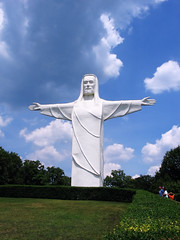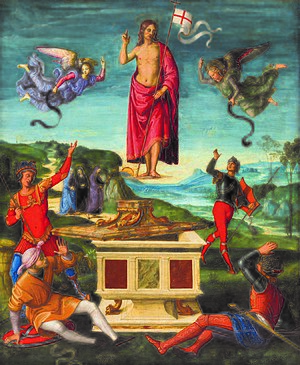| (stumpy) christ of the ozarks (Photo credit: fallsroad) |
On the cross, Christ became a sink. He took our lies, thefts, adulteries, murders, deceptions, hatreds, and enmities upon himself. All of them. He took our sins, our shame, our guilt. The whole thang. Our sins mingled with God's righteous wrath poured down the horrid sink hole of the cross.
A source produces something (a spring is a source).
| The Resurrection of Christ (Kinnaird Resurrection) (Photo credit: Wikipedia) |
| Resurrection of Christ (Photo credit: Wikipedia) |
The death and resurrection of Christ occurred in time/space as an historical event on planet Earth. It has existential meaning that cannot be ignored with impunity. We each must choose.
I have a need, a thirst, that was met in Christ.
Do you?
That is the question.
As I set out for church this morning I do so with a fresh awareness of the cross and empty tomb. Because of the cross, I am forgiven; because of the empty tomb (and my faith in it), I am endowed with new life and a fresh direction to follow.
Happy Easter. He is risen.
He is risen indeed.
Thirsty? Come to Christ and drink.




25 comments:
Christs ressurection showed us what can be. old white guy
Now faith is the substance of things hoped for, the evidence of things not seen.
Do not seek the Living amongst the dead for indeed He is Risen!
"The death and resurrection of Christ occurred in time/space as an historical event on planet Earth."
Got any evidence for this, Richard, or just your cult's fairy tales? I'd also have to question how (even if I was gullible enough to believe the other assorted claptrap that goes along with your cult's claims) using someone as a blood sacrifice in a run-of-the-mill execution for the time was supposed to do ANYTHING AT ALL for anyone else? Taken in the context of the remainder of your cult's fables, this wasn't any sort of a "sacrifice" at all, and taken in the context of historical fact, this cult leader was nothing more than the 1st-century equivalent of David Koresh.
SDC
Same Dumb Comments is that you?!?! I haven't heard from you for a while. I can only surmise that your two big buckets of nothing have produced singularity or else you wouldn't be back on here spouting your cult's fairy tales. So tell me how it all came down? I am waiting with bated breath. My heart is all aflutter. Why just the other day I heard a prominent scientist say that 'nothing' does not exist. Of course in saying so he crossed over into Christian territory but all he was trying to do was point out the obvious that Scientism's fairy tales don't make sense. I don't believe he was trying to say that only Christian Truths stand the test of time but nevertheless he did just that. Now run along Same Dumb Comments you must tend your two big buckets of nothing! Hugs and Kisses all around if only 'cause its Resurrection Day.
Still trying to peddle your self-contradictory superstition, Joe? The fact that your cult contradicts itself endlessly proves that your nonsense isn't worth the hot air you lavish on it, but in what universe do you imagine that not being able to explain something scientifically down to the last nuts and bolts means that "magic man in the sky done it"?
SDC
RkBall: I want to wish you a Happy Easter (belatedly). I spent the time with family. Two families, actually. I felt quite spread out. I did not spend any time in Church, not for lack of an opportunity. At this point, I feel almost embarrassed to appear in Church (and not because of anything anyone outside of a church might think).
I find myself disappointed in the fate of this thread. I wish I had contributed earlier (and yes, I know that my contribution adds nothing of value, but it might steer the conversation in certain directions rather than others).
With that in mind, I have a question.
You write: "He took our lies, thefts, adulteries, murders, deceptions, hatreds, and enmities upon himself. All of them. He took our sins, our shame, our guilt. The whole thang. Our sins mingled with God's righteous wrath poured down the horrid sink hole of the cross."
SDC might ask (tongue in cheek): if Christ did all of this for us, why do we have to worry about anything? Why worry about "our sins, our shame, our guilt"? But more importantly, why do we still have those things?
I can't help but suspect that at Easter, we shouldn't forget that Christ is the Son of God, and that we are made in God's Image.
To what extent does the suffering of Christ represent the suffering of so many (but not all) people on earth?
When reading the Bible, to what extent are we looking into a mirror (or mirrors) and seeing ourselves in the best and worst light?
Anon11:52:
Thank you for your Easter greeting.
"SDC might ask (tongue in cheek): if Christ did all of this for us, why do we have to worry about anything? Why worry about "our sins, our shame, our guilt"? But more importantly, why do we still have those things?"
It's a bit like a deposit that has been conditionally deposited in an account. In order for it to take effect, it must be ratified. If you look at the apostle Peter's sermons in Acts, he kind of goes: "Christ -- you killed him, but God raised him up again". The hearers were smitten with conviction and asked "what shall we do"? IOW, they intuitively knew that this narrative required a pressing and urgent response on their part. Peter's answer was, "repent, and be baptized for the remission of sins".
So, the work has been done. But for it to take effect, there is an urgent and pressing mandate for us to repent -- have a change of mind about God, ourself, sin, etc., believe the good news, and as an act of public profession, be baptized.
"contd".
The cross is a profound paradox and dilemma that works on many levels. If a person hears the gospel and responds to it, the cross works to the person's salvation, because on it Christ died for that person's sins.
However, if a person hears the message of the cross and rejects it, this puts that person in the position of being one of those responsible for Christ's death (being one in spirit with the historical figures who actually were responsible for Christ's death). This means that rather than being saved by it, they are doubly-condemned by it.
(cont'd)
The cross is also a paradox because in it we see an outpouring of God's wrath and God's love -- simultaneously.
We also see God expressing weakness and thereby overcoming the spiritual forces of darkness.
We see man responsible for Christ's death, the devil responsible for Christ's death, God who gave Christ over to death, and Christ who laid down his own life for his people's sake.
We see one race of men crucified (Adam) and another race of men (those in Christ) raised.
(cont'd)
The cross is too profound to be merely made-up, and the gospel story of God becoming a man, taking our place, and elevating us to an exalted position of being his sons and daughters is simply too good not to be true. It is profoundly not a human invention. It smacks of divinity. It is a story and an event worthy of God himself.
"To what extent does the suffering of Christ represent the suffering of so many (but not all) people on earth?"
To some extent. Often when we suffer it is because of our own foolishness. Christ was wise. Often when we suffer it is because of our sinfulness. Christ was blameless.
Another paradox -- Christ's abandonment by the Father was our reception by the Father.
"this puts that person in the position of being one of those responsible for Christ's death"
I take issue with this claim. If Christ died for all of our sins, are we all not responsible in some sense for his death? As for those who reject Christ, that doesn't exactly make them Pontias Pilate. Nor does it make them one among the crowds who called for Barabbas (though that would be a better analogy than Pilate).
You are claiming that someone is "doubly condemned" if they don't accept what you call (quite rightly) a paradox. That seems unfair. Especially given Father Keyes's response to a question of mine years ago (I was an alterboy): "Use the head God gave you."
I try. I'm sure I rarely if ever succeed. But I'm uncomfortable condemning anyone for rejecting a paradox, which is, by definition, something that doesn't make sense.
"When reading the Bible, to what extent are we looking into a mirror (or mirrors) and seeing ourselves in the best and worst light?"
The Bible paints an authentic picture of human nature. Not a glossy picture. Not an idealized picture. Not a rosy picture. Jesus expresses truth about human nature in his teachings about the heart. It was one point among many that culminated in me acknowledging Christ as Lord.
But, to the extent that I think you may be asking "is the Bible really nothing more than anthropomorphic projection", then I would say, no, it is not that. The Bible, properly read and understood, leaves no room for human pride -- which is the last thing to go. We are prideful creatures.
Again, that's why the cross is so profound. Because there is no place for pride in the cross. It is a cross of dishonor and shame.
"Another paradox -- Christ's abandonment by the Father was our reception by the Father."
You mean that "Eloi Eloi lama sabachthani" moment?
You write: "But, to the extent that I think you may be asking "is the Bible really nothing more than anthropomorphic projection", then I would say, no, it is not that."
I was trying to not come out and say that specifically, though it may be what I believe (if and when I come to a decision about what I believe... which is unlikely). But I think that what I said was still compatible with the view that we are made in God's image (not just the idea that we made God in our image).
"You mean that "Eloi Eloi lama sabachthani" moment?"
Indeed. One of the more astonishing aspects of the cross is not just that God would condescend to become a man and die for our sins, but that there would be a discontinuity in the Eternal One. The Father and Son had known communion from eternity past and that communion was brutally extinguished for a brief moment in time. The changeless God changed. The horror of abandonment by God and the sense of loss of communion enjoyed from eternity past would have ripped through Christ's psyche as an unbearable horror.
Truly, he took our place and bore our sins at tremendous personal cost.
It's too fantastic to be false; too good not to be true -- not a human invention but a story and event worthy of God Himself.
Another paradox. God, who cannot die, dies, and man, who cannot live again, is resurrected. While most people think the big problem is the resurrection, the bigger problem is the death of God. For that, the Son of God had to become a mortal human being. The death of Christ is a bigger astonishment than his resurrection. It was entirely natural that the sinless Christ should be resurrected and entirely unnatural that he should die.
It's all in the way you look at it and it seems the Cross can be looked at from innumerable angles.
"If Christ died for all of our sins, are we all not responsible in some sense for his death?"
Yes. In two or three senses.
1. Our sins precipitated God's loving response which was to offer his Son for us -- which you have alluded to.
2. In rejecting God's law and going our own ways, in choosing x over God, we all (in our pre-repentant state) put in the camp of Pilate and the crowd. We all choose to assign Christ to death rather than worship him.
3. In hearing the gospel and rejecting it, we condemn him to death again. In condemning him we double-condemn ourselves.
This is another paradox. The gospel when heard either draws a person closer to God or further away. So it always works either towards salvation or damnation. The apostle John said this is the condemnation, that light has come into the world, and the world has chosen darkness. In John's day, the light was Christ himself. In our day, it is the proclamation of the gospel.
So, the gospel works both salvation and wrath.
"Use your head".
Yes and no. The book I am laboring through Passionate Reason or whatever it's called, goes into this. Independent reason, i.e., reason apart from a humbled heart, will not get the job done. Spiritual truths are spiritually discerned. Since God is light, he can shed light or withhold light -- we are beholden to him; coming to knowledge of God and faith in him does not rest with our prideful self-sufficient investigations.
So, I would add, "use your heart".
And your knees.
Like I did.
About using your heart as well as your head:
I came across something the other day, a primary text, that referred to thinking with the heart (as an off hand comment... I love off hand comments that strike me as strange, but obviously didn't strike the original writer as strange). Maybe it was Hobbes...
Ah yes, it was Hobbes. I'm amazed I found this so quickly. "And first the word of God seemeth to place the divine law in reason; by all such texts as ascribe the same to the heart and understanding" (He then goes on to quote several passages from the bible).
I still have a problem condemning people for not accepting paradoxes. Why should we demand that others accept things on faith that don't make sense, when so many false religions and ideologies ask for the same pattern of thought?
You say that "The cross is too profound to be merely made-up"; that "It's too fantastic to be false; too good not to be true."
Why should someone believe this? Aren't we taught that if it sounds too good to be true, it probably is? And what about other stories that seem too good to be true (at least from a certain point of view)? The stereotypical example that comes to mind involves eternal life with 70 virgins upon martyrdom.
I don't find fault with anyone who rejects that promise either.
Don't you think that some people can reject the gospel "in good faith" (if you'll forgive the phrase) because they aren't willing to accept anything on faith alone?
"I still have a problem condemning people for not accepting paradoxes."
No-one is condemned for not accepting paradoxes. The paradoxes are one of the sublime dimensions of the Cross, but they are not the message itself. We are condemned for a) our sinful condition, b) our sinful thoughts and actions, c) our failure to humbly seek truth, reality... God, and d) our rejection of the the gospel when presented to us.
In our natural state, because of what we do, we are in deep do-do!
"Why should someone believe this? Aren't we taught that if it sounds too good to be true, it probably is?"
When I say that it is too good to be true what I mean by this is in its rejection of human pride and self-glory, and in the disproportionate blessing that God bestows on the human race, it is too good to be of human origin. IOW it has the ear-marks of being of divine origin, and therefore must be true. No human would conceive of a gospel where there is no room for human pride and self-glory. In an invented gospel, Peter would not have denied Christ, Paul would not have participated in murder, and Christ would have come down from the cross and whacked his enemies in a great display of power.
The display of humility and powerlessness that CHrist presented on the Cross, against all reason (!) and against all expectations, followed by the glorious and unexpected triumph on the third day... no my friend, this is a message that is simply too different, too profound to be of human makings. It has the imprint of the divine on it, unlike the Johnny-come-lately revisionist Islamic doctrines with their crude literalists and 70 virgins.
Post a Comment